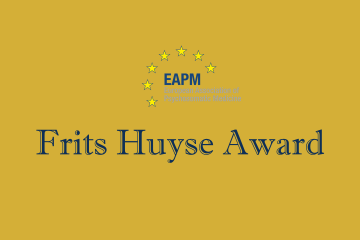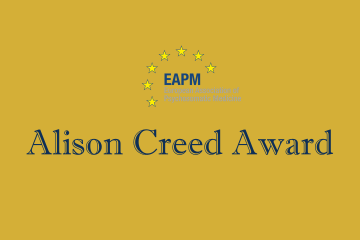The Editor’s choice March 2024
written by Antonina Mikocka-Walus, Deputy Editor, Journal of Psychosomatic Research and Jess G. Fiedorowicz, Editor-in-Chief, Journal of Psychosomatic Research, Professor and Senior Research Chair in Adult Psychiatry, University of Ottawa, Head and Chief of Mental Health, The Ottawa Hospital Scientist, Ottawa Hospital Research Institute, Journal of Psychosomatic Research in March 2024.

Antonina Mikocka-Walus, Deputy Editor, Journal of Psychosomatic Research
The Editor’s Choice
“Differentiating between physical and mental fatigue matters in long-Covid“
This quarter’s Editor’s Choice looks at fatigue in post-acute sequelae of COVID-19 (so called long COVID). Listed as one of the most common symptoms of SARS-CoV-2 infection, fatigue – a sense of tiredness not improved by sleep or rest – can encompass difficulty in completing physical as well as cognitive tasks. But mental fatigue also includes an emotional dimension and in the context of COVID has been associated with increased risk of depression and anxiety symptoms (1).
Schurr et al. (2) conducted a controlled population-based longitudinal survey exploring physical, mental, and overall fatigue, and its associated factors, in an adult community sample not yet infected with SARSCoV-2 versus a separate sample of those from the same area with a proven SARS-CoV-2 infection. The sample was representative of the local population based on age and sex. The study gathered data on three occasions: May 2020 (T1), November 2020 (T2), and July 2021 (T3). Fatigue was measured using the 10-item Fatigue Assessment Scale (FAS)(3), with symptoms of anxiety and depression assessed by the PHQ-4(4). The regression analysis was adjusted for smoking, coronary heart disease, respiratory disease, and previous mental disorders.
The authors summarize their findings in the following passage:
We investigated trajectories of overall, physical and mental fatigue and their associated factors in a controlled population-based study up to one-year post-infection. We found that, overall, baseline mental health burden, including anxiety, depression and stress symptoms, was more strongly associated with fatigue than infection itself. While the previously infected group more frequently experienced severe physical and overall fatigue at six months post-infection, the control group reported comparable fatigue scores after one year. No significant differences were found between the groups regarding mental fatigue. Differentiating between physical and mental fatigue within the post-COVID context may therefore help to clarify the post-COVID syndrome.
From a public health registry, 606 previously infected with SARS-CoV-2 were identified and compared to a control sample including 1384 participants from a separate probability sample of the community. Fatigue increased over time in both groups. Those previously infected reported worse fatigue at T2 than the control group of a negligible to small effect size (d=.15 SD), but this group difference disappeared at T3. Those previously infected also reported higher scores of physical fatigue, compared to those non-infected at T2, with a small effect size (d=.22 SD) and no group difference at T3. The groups did not differ on mental fatigue at any point. Symptoms of depression, anxiety, and stress at T1 were associated with total, physical and mental fatigue at both T2 and T3. Those younger reported higher total and mental fatigue at T2 and females reported higher total physical fatigue at T2 and T3. Interestingly, respiratory disease and coronary heart disease were not associated with any of the fatigue outcomes.
While COVID-related research abounds in the current medical literature, few controlled population-based studies have been conducted to date, with Schurr et al.(2) one of the first groups worldwide examining fatigue over time in those infected versus uninfected by the virus. It is clear from their study that Covid infection has at least a short-lived impact on physical fatigue, reflecting the burden of the virus. However, the effect size observed by the researchers was small and, while the group differences were statistically significant, their clinical significance is uncertain. Fatigue is not uncommon in the general population and therefore the portion of fatigue attributable to COVID may be relatively small. Nevertheless, the authors are right to suggest that physical fatigue may represent a larger part of the long-COVID syndrome than mental fatigue. Therefore, differentiating between physical and mental fatigue within the post-COVID context may help better define the post-acute sequelae of COVID-19. If further research confirms that physical fatigue is indeed a major concern, at least during the first few months post-infection, programs focused on physical functioning and activity might have a place in the treatment of long COVID.
A surprising finding may be a non-significant relationship between the SARS-CoV-2 infection and mental fatigue. At the same time, however psychological variables – symptoms of stress, anxiety, depression – were associated with all types of fatigue. It could be that those more psychologically vulnerable at the beginning of the pandemic were more strongly affected by fatigue during the course of the pandemic, compared to people without mental health issues. Therefore, addressing stress, anxiety, and depression may be an important pathway for those experiencing post-infection fatigue.
References
- Torrente F, Yoris A, Low D, Lopez P, Bekinschtein P, Vázquez GH, et al. Psychological symptoms, mental fatigue and behavioural adherence after 72 continuous days of strict lockdown during the COVID-19 pandemic in Argentina. BJPsych Open. 2022;8(1):e10.
- Schurr M, Junne F, Martus P, Paul G, Jürgensen JS, Allwang C, et al. SARS-CoV-2 infection is associated with physical but not mental fatigue – Findings from a longitudinal controlled population-based study. J Psychosom Res. 2024;178:111598.
- Michielsen HJ, De Vries J, Van Heck GL, Van de Vijver FJR, Sijtsma K. Examination of the Dimensionality of Fatigue: The Construction of the Fatigue Assessment Scale (FAS). European Journal of Psychological Assessment. 2004;20(1):39-48.
- Löwe B, Wahl I, Rose M, Spitzer C, Glaesmer H, Wingenfeld K, et al. A 4-item measure of depression and anxiety: validation and standardization of the Patient Health Questionnaire-4 (PHQ-4) in the general population. J Affect Disord. 2010;122(1-2):86-95.




0 Comments